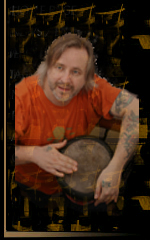 Interview
from: MIKEDOLBEAR.COM
1: So how did it all start?
It was a bizarre thing; I was just walking past a drum shop and I thought, I'll have a drum lesson, for no readily explainable reason. I went in and it made sense to me in a way that other things in my life hadn't before, you know, education or anything like that. I was soon playing in a punk band on the
London rock scene, and I accidentally stumbled across an Indian gig. It was
Ustad Zakir Hussain and Ali Akbar
Khan, and it was amazing. I didn't know what they were doing. When you see tabla for the first time, a good player, it's the most amazing thing, it's stunning. I had no concept of what he was doing, but that made an impact on me. Later I saw tabla lessons advertised in the local adult education magazine, and I was down there like a shot. Of course, the actual transformation took somewhat longer, several years of dedicated study, in fact, although it was a fairly enjoyable period of learning.
2: You studied North and South Indian percussion at the Madras academy how did that come about?
Actually, the academy is in London, it's just that all the teachers are from
Madras. I think they've closed now though. It was a really intense study, they won't let you go half way. It's all or nothing or they won't teach you. I studied
Mridangam, Kanjira,
Natuvangum and a little bit of Ghatam (clay Pot). That is a mad instrument. You literally smack it with the underside of your wrist to get the bass tone. It caused me some physical problems so I stopped it.
3: You play such an impressive range of percussion instruments from all around the world. Do you have to make adjustments in your approach from going one to the other, either physical or mentally?
Well, I try to keep an open mind with it all. I am not one of these pedantic types who starts blabbing on about it not being 'in clave' or limiting what is available on the instrument. OK, if you are playing within any idiom then you need to play in the traditional way but if you are playing outside of that
environment why limit yourself unless you are unsure of yourself. Being creative is gods gift to us so what possible benefit is there in denying it. Where would the development of hybrid western music be without that freedom of mind?? If people want to limit themselves that is fine by me but if
they want to use that as a springboard to criticise others then they are fully qualified TO$%**RS.
4: What advice do you have for anybody who wants to make a career out of playing?
Well, it seems to me that development as a musician and success at a career are two entirely unrelated things. Drummers are mislead by clinic culture into developing levels of technique that are rarely required on day to day sessions. I think it has got more drummers the sack than done them any favours.
In practice you need to have a musical application. Work in song forms A B A B C A B etc and develop the parts musically without overplaying. Work REALLY hard on playing with a click and keeping good time. Play behind the beat, on the beat and ahead of the beat. Stick your ego in the bin and be an easy and uncomplicated person to work with. As far as groups are concerned they are interested in feels, NOT fills!!!
Most importantly, don't doubt yourself or compare yourself to others in a negative way. Use other peoples ability as an inspiration, not a negation.
Use what you can do as effectively as you can and know your limits. That has been the recipe for many a success.
5: When you do film scores do you A: have any freedom in what you play? Or B: is everything written out?
There is usually total freedom for me, although rough parameters are set down regarding instrumentation.
6: I understand you build your own percussion instruments for special effects; can you give us some examples?
Yes, mainly bizarre sound effects. Things tied together in a similar fashion to Meinl birds etc. Drums chopped up with snares added. I don't have the room for a workshop at home but when I do, I will go mad with it.
7: When you get time to practice what do you practice?
Musicality more than technique. Obviously you need to keep your hand in but I am more into composition and developing along that line. To be honest, things are going so well at the moment that I don't get that much time to practice and working a lot serves the function of 'keeping fit'
8: What's coming up in the near future for you?
I I have two new albums coming out soon. A second album from Network of Sparks featuring musicians from
Pakistan, Ghana,
Japan and the UK and a second album with Japanese master drummer
Joji Hirota. This is gigging extensively in the summer. I have collaborations later in the year in
Azerbaijan and India and will most likely be going back to
Pakistan to record with the Mekaal Hassan band again. I have three books due out, along the lines of stones stick control applying inverted stickings etc. Then I will be
heavily involved watching England win the world cup and
Pompey get promoted to the premiership and win that in their first season up!!!!! All this will be executed seamlessly alongside my session work in the
UK. I tend not to go away for long tours as this gets in the way a bit.
Check it all out at www.petelockett.com/news.html or email me via the web site.
RETURN TO INTERVIEWS /
PRESS MAIN PAGE
 |
